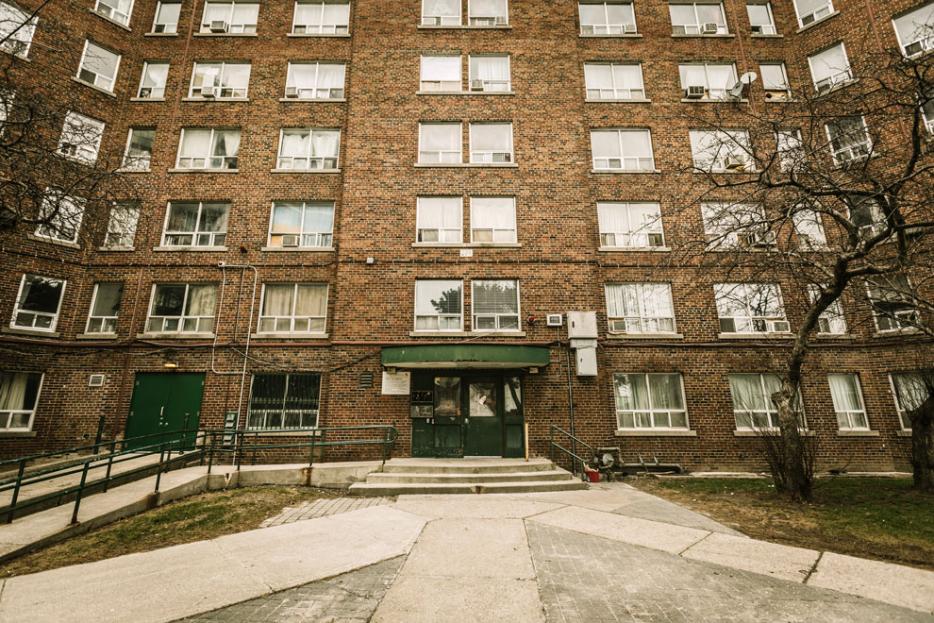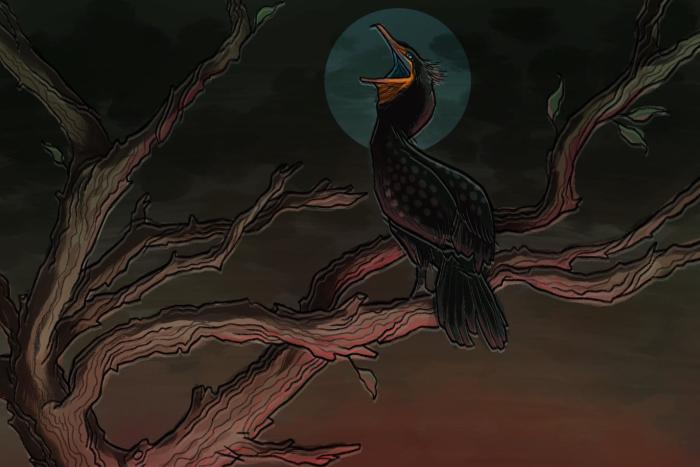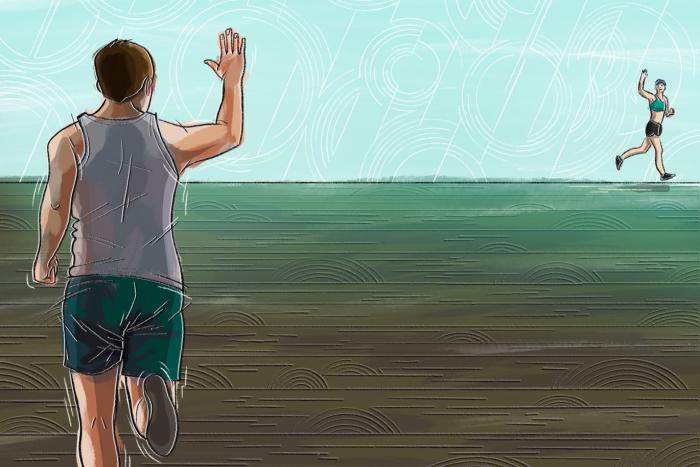Way up on Weston Road, in a linoleum-lined kitchen that overlooks a basketball court and a giant park, Fozia’s head was spinning. The children were in school. Her plight wasn’t different from other hoyos in the neighbourhood but she had no way of knowing. One spoke little about these things.
It was Ramadan so any water or pills were taken out of sight of her husband. Fozia wasn’t a puny refugee; she had fought a tyrant most don’t remember. She had a bullet lodged in her side. When her husband wanted to cause her pain, he’d grab her waist tightly. She’d smile and her friends were envious. They wished their husbands were as affectionate.
Here, she’s stuck in a grey high-rise surrounded by bungalows housing Filipino families, aging Italians and Poles. She looked out at the landscape and saw life go on below. She wondered about ending it once and for all. Grind up sleeping pills in the children’s dinners and take her sweet time torturing her husband. She’d throw acid in his face and let him wander. She’d lock the place from the inside and stalk him.
Please Fozia, stop! I’ll be a better man. Please, for the love of the Almighty!
She’d start stabbing him when the amphetamine kicked in. Sadly, these thoughts remained fantasies. She felt like a failure whenever she’d snap out of it.
Do it then. If you’re not a coward, do it!
Her thoughts returned to the battlefield and the men she dispatched over the years. She was a lioness at one point but now she was a prisoner in Toronto.
The first time she heard about the war for liberation in the Ogaden, the land between Somalia and Ethiopia, was when her family sat around the radio in Mogadishu. They listened to the stories of the fighters who resisted Ethiopia’s Emperor Haile Selassie. In 1974, the Lion of Judah as he was called was struck down and the ancient empire became a socialist republic. She wanted to free her brothers and sisters who still were under the thumb of the habesha. She signed up to fight but didn’t tell anyone she was due to leave for basic training. Her mother cried and her grandmother yelled at her.
Naya Fozia! Look at what you’re doing to your hoyo! Have you no shame! What business do you have fighting habeshas? Where did you dream this up! Ya’Allah! Ya’Allah! May You restore her to us safely.
They travelled in the back of an army truck. She was joined by fifteen other women. They drove to Beledweyne, near the Ethiopian border, and the wildlife along the Shabelle Valley mesmerized her. Sun-kissed children ran alongside the convoy, clapping and singing for them. When they camped at Feerfeer, on the Somali side of the Provisional Administrative Line, they sang.
Maanta, maanta, maanta!
The children were four in total. There were three girls; they were the eldest, and one boy, who had started grade school at Portage Trail Community School, joining his sisters. Our heroine spoke little English and her eldest daughter Samiya translated for her. After a parent-teacher conference, her husband blamed her for the children’s failing grades. He slapped her into tomorrow. When she fell down, he kicked her in the head. Fozia lay there all night, passing in and out of consciousness. This is where her middle daughter Aaliyah found her.
Hoyo, are you OK?
The little girl showed signs of a disorder. For one thing, she tormented small animals. The neighbours placed mesh atop the walls dividing the balconies, in case their cats leapt over to the other side and found Aaliyah sitting there, bored and playing with garden shears. Several cats had been found at the bottom of the building. One had been decapitated. At school one day, the teacher told them that salt kills snails. Aaliyah walked along the Humber and gathered as many snails as she could. She set them down on a picnic table and poured salt in a circle. The snails were in the middle and she prodded them with a twig. Foam bubbled out from the shells as they were pushed onto the ring of salt.
The advance into the Ogaden was moving quickly. The Somali army was allied with the Western Somali Liberation Front. The liberation front was formed by Somalis in the Ogaden to resist Ethiopian rule. They saw themselves as inheritors of the famed anti-colonial warrior mystic, Sayid Mohamed. Life on the front was hard. The women of the Liberation Front cracked jokes about Fozia. She screamed at the sight of a snake. She hated the food and began missing her mother’s goat and rice. Sweet yellow mangos. Papaya sprinkled with lemon juice. She was tired of eating dates and the oodkac was giving her heartburn.
Do these people not have fruit?
She killed her first habeshas in the battle for Jijiga, in the Somali region of Ethiopia. The fighting was fierce. She felt the tremors of the shells. Around the corner of a collapsed building, the squad commander spotted the enemy handing out rounds of ammunition and Kalashnikovs from the back of a truck. They ambushed them and seized the shipment. She stood over their bodies, spat on them and cursed them with the Arabic word for pig.
Ganziir!
It was time to break the fast. The children were each allowed one samosa and a couple of dates. They were too young to fast. Their mother told them they can fast when they turn twelve. Aaliyah was two years away. They joined their father to pray while she finished preparing the meal.
Fozia loved their enthusiasm for Ramadan. Back home, her grandmother taught her how to fill and fold the samosas. She thought about the times she helped her grandmother cook. At first, it seemed menial.
Grab this container, fill this cup.
Then it got more hands-on.
Chop this onion, slice these peppers.
Fozia’s grandmother used to caution her around the kitchen and recount all the accidents she had over the years. The fold between her index finger and thumb was scarred by hot oil. Her forearm had the rounded imprint of a pan. Fozia drifted back to the comfort of yesterday.
Habibti, get away from the oil. You’re not ready for that yet. Get me more flour and mix it with water. Do you remember how much water it needs?
Fozia nodded. She scooped a cup of flour into the bowl and slowly added water.
Here ayeeyo. Is this good?
Mashallah!
Fozia felt her grandmother’s lips as she bent down to kiss her on the forehead.
What would I do without you, habibti!
Fozia took another Tylenol when Aaliyah walked in and saw her sipping water.
Hoyo, you’re not supposed to do that! That’s haram!
She grabbed Aaliyah by the arm and covered her mouth.
You will not say another word. You understand?
Aaliyah nodded and she let her go.
Tell your father the food is ready.
Aaliyah was at school and the teacher asked her where the bruise on her arm came from. She told the teacher that it was her father’s doing. The teacher shot up and reported it to the principal, who in turn alerted the Children’s Aid Society. A social worker came by the next day and told the mother, through a translator, that her husband had to leave the home or the children would be removed. When the visitors left, she started yelling.
I know your father doesn’t beat you but now you have these white people in my home threatening to break up my family!? Who said it!
Aaliyah stepped forward and bravely answered that it was she. Her mother took a shoe and gave her something to tell her teacher about.
The next day, Aaliyah sat in the classroom when her friend Hakima said her brother was going to pick her up on his moped. She asked Hakima if her brother could take her as well. When they reached a gas station to refill, Aaliyah took out a jar she’d taken from the classroom and pumped gasoline into it. Aaliyah strong-armed Hakima into silence when her brother returned.
That night, when the children of Weston Road were asleep, Aaliyah stood over her parents’ bed. The jar of gasoline in one hand and a lighter in the other. She poured it on her father’s face and chest. Before either one could figure out where it was coming from, the bed was on fire. Her mother crawled to a corner. From there she saw her husband furiously shaking while her daughter marveled at what she had done.
Fozia took her to the police station. She told them her husband beat Aaliyah and the violence disturbed her. Her mother told her to keep quiet and let the attorney speak.
Brother, you should have seen the inferno!
When the Crown attorney posed questions, she regurgitated the answers her mother fed her. When the decision to find her criminally not responsible came down, the mother allowed the province to care for her daughter at a mental institution.
The days felt long and drawn out. Fozia was ashamed to show her face around the neighbourhood. She called Toronto Housing about a transfer but a subsidized unit big enough for a family was hard to come by. One day, she had enough. She marched into their offices on Elm Street. She requested a translator.
Can you tell this woman I need a transfer. I’ve been waiting for years. My husband died there and it’s giving me nightmares. I can’t stay there any longer.
I understand her frustration but the city hasn’t been building enough public housing to keep up with demand. We’ve been relying on developers to give us units in their new buildings. The list is very long. She has to wait.
How long I wait!? Waiting, waiting, nothing!
I understand ma’am but there’s not much I can do.
She took a deep breath and gathered her papers and her purse. When she got to the subway at Queen’s Park, she saw a man who resembled her dead husband. She stared at him until he got on the streetcar. On her way to Lawrence West station, she thought about the journey she took to meet him in Toronto. After the Ogaden War ended in defeat, many people became disillusioned by the empty promises of the regime. Friday’s mandatory neighbourhood cleaning became insulting. She refused to sing Marx, Engels, Lenin iyo Siad. Her mother told her to join the singing. She didn’t want Fozia reported to the neighbourhood committee.
In 1979, her mother’s clan had been targeted by the regime. Their wells were poisoned and cattle destroyed. Thousands died from starvation. She slipped into the night and joined the rebels. She became a fighter for the Somali Salvation Democratic Front (SSDF). SSDF was started after a failed coup against the military regime. They hailed from one of the larger clans in the country and the regime repaid the treachery with interest. Fozia turned against the army she once served. In a raid on an arms depot in the port of Boosaaso, she was injured and captured. The guards refused to let her see a doctor and the other women dressed her wound. None of them wanted to risk her death by pulling the bullet out. She languished in jail for years.
After a general amnesty in 1989, she returned home to find that her grandmother had passed away. She cried and cried. She beat her chest and smacked her head. The wailing was heard around the compound. Her mother urged her to eat. She refused food and locked herself in a room at the other end of the house. She refused her mother’s offer of an imam coming to pray over her.
In the midst of her mourning, the country devolved into all out civil war. Then, one night, she could hear gunshots outside. She rushed to her mother’s room and found her on the floor. She laid down beside her and stroked her hair.
We have to get out of here, hoyo. The fighting is getting worse every day.
Habibti, I can’t make the journey. If Allah sees it fit, I’ll die.
I can’t leave you here.
Don’t worry about me. These rebels won’t kill an old woman. I’ll invite them in and offer them tea. I’ll be fine. You’re a young woman, you need to get out and live your life. Make sure to visit me when the fighting ends. You’re all I have.
She ran away at dawn. Her stomach was in knots. Her siblings were scattered around the world. They were counting on her to get their mother out. She felt lost. The only sounds she heard were bullets. Explosions off in the distance. She joined the movement of people leaving Mogadishu. She made her way to Beledweyne and from there went to the small town on the Ethiopian border where she had launched her dream of freeing Somalis living in the Ogaden. In Feerfeer, she gave a nomad her mother’s wedding jewels to carry her into Ethiopia. She made it to Djibouti and was selected by a charity to head to Toronto.
When she got here, she stayed in a refugee centre on Lippincott Street. She found it hard to sleep. She was placed on dish duty and it was there that she met her husband. He was charming at first. He took her out to the movies. They walked down Bathurst Street to the lake and reminisced about their lives back in the Horn. They agreed to move in together but Fozia wanted to get married first. She invited the Salvadoran woman who ran the kitchen to be her witness and he invited the Somali translator who prepared them for interviews with immigration. They rode the 45 Kipling bus from the subway. She wore a purple skirt with a gold shirt. She put on a lavender hijab and she wore jewelry lent to her by a Somali woman at the refugee centre.
Aaliyah found herself in a hospital that in a few years’ time would be shut down due to unexplainable deaths and unusual treatments on the patients. Night watchmen and orderlies raped her repeatedly. She tore out chunks of her skin with her teeth so her therapist recommended she have them removed. Her meals consisted of oatmeal, soup, and mashed potatoes. Aaliyah’s rage was tempered through frequent sedation and she stopped thinking about what day it was. They were allowed walks in the inner courtyard. She attended school. The teachers yelled at her for falling asleep. The staff punished her by keeping her sedated. She soiled herself and the staff dragged her into the shower and let the hot water run over her.
She thought about the day her mother would get her. If she knew, she’d come. Aaliyah just knew it. She had saved her mother and soon hoyo would realize what a heroine Aaliyah was. She was sure of it. She dreamt about it. An orderly would assure her that her mother would. She began trusting this man because he seemed to understand her pain. He showed her pictures of his newborn and she asked about his baby whenever he worked. He told her that his mother died when he was young and that Aaliyah shouldn’t hate her mother. One day, she told him about the things that were happening to her. She started crying as they sat on the bench in the hospital’s courtyard. He put his arm around her and told her to have faith.
That night, he came into her room and helped himself to her body. Who could she trust? She retreated into her numbness and the hatred for her mother surged upward. Why didn’t she fight for Aaliyah? She told Aaliyah to say those things and she said she would come back home. Aaliyah did her part but hoyo lied. She plotted her revenge as his curls slashed her across her face. They felt like splinters piercing her torn skin.
By the time she was seventeen, she was released through a program the province set up to compensate victims of the scandal. The whole thing was exposed when the therapist who ordered her teeth removed was caught up in a pedophile sting. He took great pleasure in detailing his treatments on the patients. He referred to them as inmates. He wrote about the nightmares Aaliyah had. Her father, still ablaze, chased her around.
Come on, give your father a hug.
He wrote that her sedation should be around the clock for her wellbeing. Patients' charts entered into the public record, as a part of the inquiry, found that patients were sedated for weeks on end.
The beginning of their marriage was bliss. She felt a sense of hope about this new place. He got a job in a shampoo factory and on the weekends drove his friend’s cab. They got an apartment at Weston and Lawrence and before long, she was pregnant. It was then that the insults began. She couldn’t do anything right. He warned her not to socialize with the other women in the building or the neighbourhood.
They will turn you against me. Those vipers.
After she had Aaliyah, he started laying hands on her.
If I do everything right, he won’t get upset.
He told her to drop out of adult school. He spent the weekends away from home. She heard he was seen driving a neighbour of theirs around to do her errands. She felt relief that he wasn’t home.
After her release, Aaliyah was placed in a halfway house downtown. She didn't make friends and the best she could do was small talk. None of the staff were told she was a victim of the scandal. The ministry of health assigned her a social worker and the staff were only privy to her housing needs and the fact that she had been found criminally not responsible. Her social worker arranged for dentures. Aaliyah didn't like wearing them. They made her feel old.
While on a supervised community visit, she asked a fellow resident, in Somali, if she could do her a favour.
I need a gun.
Allah! Sis, I don't get mixed up in that shit anymore.
Listen, I have money.
This shit is no joke. I just got out.
I'll give you 5000 today. I have more but I need it by next week.
I'll see what I can do. How are you going to get the money to me? They've been doing a lot of searches lately.
I'll figure it out. Money order?
That works.
Aaliyah looked up the address of one particular offender and stalked him for weeks. He used to work the night shift at the hospital. He would come into her room whenever he felt like it. She found herself drifting off. If hoyo hadn't let them take Aaliyah, she wouldn’t be here. She wouldn’t be this monster without teeth. She hated looking in the mirror. She bristled whenever a man brushed past her. She didn’t want the world to see her ugliness.
She waited for the opportune moment and crept into the orderly’s townhouse. He was playing with his daughter before he noticed her. She shot him in the head. She thought about shooting the little girl too but changed her mind. A neighbour found the daughter an hour later.
Next she went to her mother’s building and waited for her to return from Friday prayers.
Please habibti, you don’t have to do this!
The superintendent discovered Fozia's body. The day before she'd asked him to replace the batteries in the smoke detector, minutes before she fell victim to the toothless fury of her daughter. Hoyo never came. She never called or wrote to her. Aaliyah rescued her and she let her be torn apart by wolves.
Aaliyah took a walk along the Humber Trail. She threw the gun in the river. She bought a mango juice at the gas station a block away from the highway. She bought a pound of sour candy from the bulk store. She got on the 89 Weston bus to Keele station. She watched the landscape drift by as the projects morphed into tree lined streets with a lawn bowling club.
She walked past the tweakers at Yonge and Bloor streets. She made her way down Isabella Street and sat on a bench near the halfway house. She took the dentures out of her pocket. She put glue on both sides and popped them in. It was uncomfortable but she took a deep breath and thought about the furniture she’d get for her new apartment. The future seemed bright.






